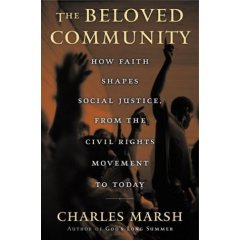 A while back I promised to post my top 5 books of 2005. We're now a long ways from end-of-year recollections, but I'll try to make good on the promise. I don't mean this to be an "objective" list of the best books from last year (as Napolean replied to Kit: "Like anyone could even know that!"). Rather, they're five books that stick out in my memory of a year of reading.
A while back I promised to post my top 5 books of 2005. We're now a long ways from end-of-year recollections, but I'll try to make good on the promise. I don't mean this to be an "objective" list of the best books from last year (as Napolean replied to Kit: "Like anyone could even know that!"). Rather, they're five books that stick out in my memory of a year of reading.1. Charles Marsh, The Beloved Community: How Faith Shapes Social Justice, From the Civil Rights Movement to Today. Hands down, my favorite book of 2005, and one of the best books I've read in a long time. Marsh does an excellent job rescuing the civil rights movement from liberalism and demonstrating its thick connections to the particularities of the worshipping community. Because of its ecclesiocentric roots, Marsh evaluates the "secularization" of the civil rights movement not as its completion, but rather as precisely that which stunted its effects. This book is also a model of "public" theological writing--that is, theology undertaken as public intellectual discourse without sacrificing the rigor of theological confession and precision. I can't speak highly enough about Marsh's accomplishment.
2. Alan Jacobs, The Narnian: The Life and Imagination of C.S. Lewis. This was an end-of-year treat for me. Jacobs navigates a course between hagiography (all too common in Lewis literature) and cynicism (think A.N. Wilson). It is a solid intellectual biography that helpfully explores interesting tensions in Lewis (particularly the intra-psychic tensions between the worlds of philosophy and literature, logic and fantasy), as well as several curious snippets about Lewis' interest in sado-masochism [that doesn't show up in the hagiographies]. The end of the book felt a little rushed (the movie release date approaching?), but throughout I particularly enjoyed Jacobs' account of "Faery" as central to Lewis' thought. An enjoyable read.
3. Nicole Krauss, The History of Love. As I noted earlier on this blog, a wonderful literary novel.
4. Creston Davis, John Milbank, and Slavoj Zizek, editors, Theology and the Political. This is the only "academic" book I'll include, but I think it is a landmark volume on the boundaries of philosophy, theology, ontology, and politics. It will take a year to digest it all.
5. George Weigel, The Cube and the Cathedral: Europe, America, and Politics Without God. I continue to feel an allergy to Weigel's (Constantinian) politics and (basically neo-con) economic leanings, and yet I find myself often in deep agreement with his diagnoses of what's wrong with the West (in which he echoes much of Benedict XVI's own diagnoses). This book offers a compelling contrast between the poverty of European liberalism and the richness of Catholic social thought.







